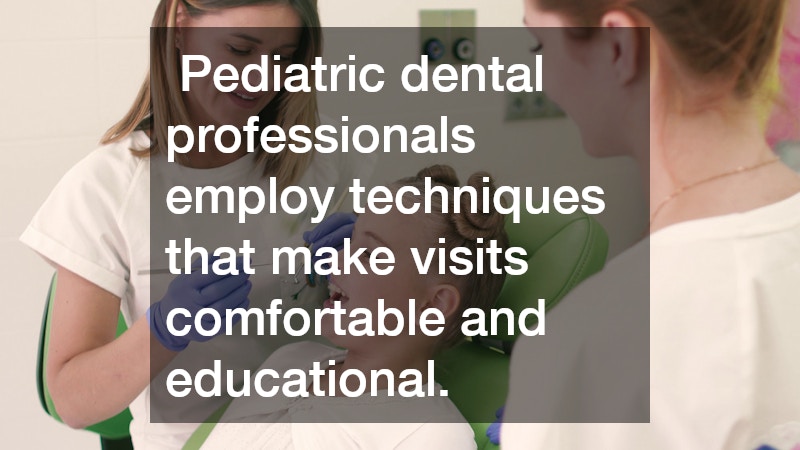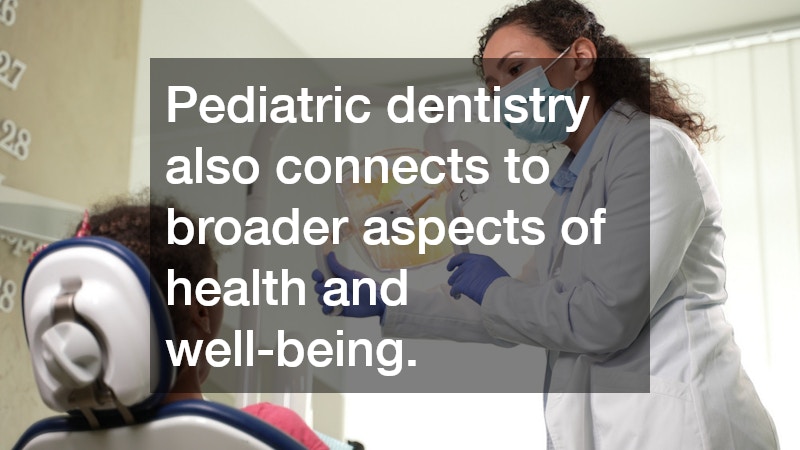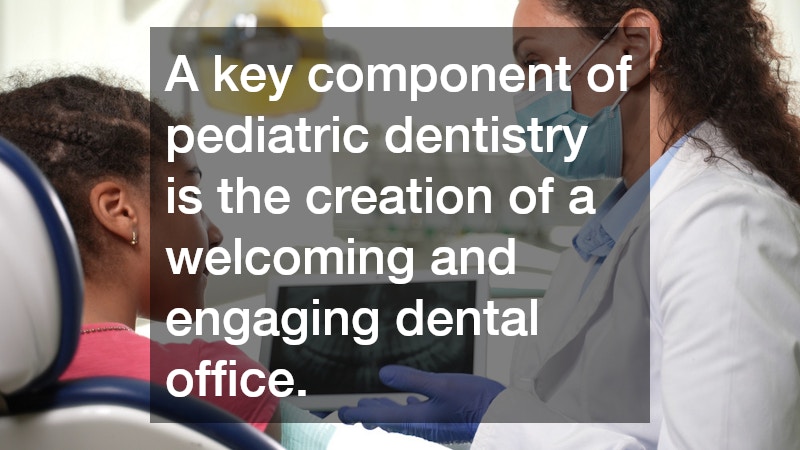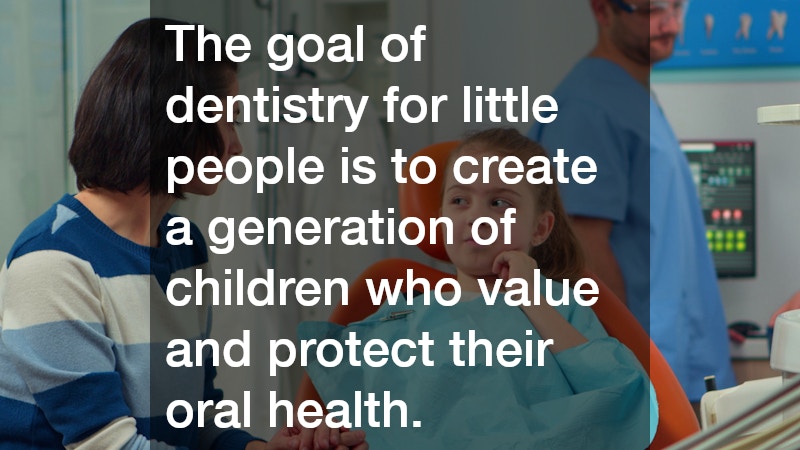
Ensuring Healthy Smiles How a Pediatric Dental Visit Sets the Stage for Lifelong Oral Care
Maintaining a healthy smile starts early, and pediatric dental visits play a crucial role in establishing lifelong oral health habits. For children, these visits are more than routine checkups—they are foundational experiences that shape attitudes toward dental care and wellness. Specialized dentistry for children, often referred to as dentistry for little people, is designed to address the unique oral health needs of young patients. From infancy through adolescence, children require tailored approaches that differ significantly from adult dental care.
Early dental care not only focuses on teeth but also supports overall health, including jaw development, speech, and self-confidence. Pediatric dental professionals employ techniques that make visits comfortable and educational, ensuring that children associate oral care with positive experiences rather than fear. A well-trained dentist or family dentist can transform a simple checkup into a fun, engaging experience, cultivating good oral hygiene habits that persist into adulthood.

Balancing Family Life and Oral Health
In today’s busy world, parents juggle school schedules, extracurricular activities, and health appointments, often working with day schools, managing business commitments, or consulting a personal accountant to stay organized. Incorporating pediatric dental visits into this routine ensures that oral health doesn’t get overlooked. A family’s commitment to consistency—scheduling biannual checkups and daily brushing routines—builds accountability and discipline in children, reinforcing the importance of preventive care.
Modern dental offices are designed to make children feel welcome, often featuring colorful décor, interactive play areas, and friendly staff who explain each procedure in kid-friendly terms. This child-centered environment reduces anxiety and helps young patients view dental visits as a normal part of life rather than something to fear.
Connecting Oral Care to Overall Wellness
Pediatric dentistry also connects to broader aspects of health and well-being. Today’s families often explore complementary wellness practices—from skincare innovations like microneedling to scientific advancements in product chemistry that influence nutrition and hygiene products. Similarly, oral health plays a critical role in whole-body wellness, influencing everything from digestion to confidence in social interactions.
By focusing on dentistry for little people, families can lay the groundwork for a lifetime of healthy teeth and gums. This article explores why early dental care matters, what makes pediatric dentistry unique, when a child should first see a dentist, and how parents can support long-term oral health.
1. Why is Early Dental Care Important for Children?
1.1 Understanding Early Dental Development
Children’s teeth, both primary and permanent, develop in stages that require attentive care. Primary teeth, commonly called baby teeth, serve as placeholders for permanent teeth and play a role in proper jaw growth, chewing, and speech development. Neglecting these early stages can lead to complications such as misalignment, cavities, or even infections that affect overall health.
Pediatric dental visits provide professionals the opportunity to monitor these developmental stages closely. Dentists can identify early signs of enamel erosion, malocclusion, or jaw issues and recommend preventive measures. Early intervention often eliminates the need for more extensive and costly treatments in the future.
1.2 Preventing Dental Issues from the Start
Prevention is at the core of dentistry for little people. Children are particularly susceptible to cavities due to dietary habits, teething stages, and natural curiosity. Pediatric dentists educate families about proper brushing techniques, flossing routines, and dietary choices that limit sugar and acid exposure. Preventive care often includes sealants, fluoride treatments, and regular cleanings, which collectively reduce the likelihood of serious dental issues.
Early dental care also plays a role in teaching children responsibility. By understanding the consequences of poor oral hygiene at a young age, kids are more likely to adopt lifelong habits that protect their teeth.
1.3 Building a Positive Dental Attitude
Perhaps one of the most significant benefits of early pediatric dental visits is psychological: creating a positive dental experience. Children who associate dental care with fun, encouragement, and safety are less likely to experience dental anxiety as adults. Dentists often use playful language, demonstrations, and reward systems to foster a welcoming environment.
A positive early experience also enhances trust between the child, parents, and the dental office. When parents reinforce this attitude at home, it solidifies a strong foundation for lifelong oral health.
2. What Makes Pediatric Dentistry Different?
2.1 Specialized Training in Pediatric Dentistry
Pediatric dentists undergo additional training beyond standard dental school, focusing on child psychology, growth and development, and specialized techniques suitable for young patients. This training equips them to handle unique challenges, from managing anxious children to addressing developmental dental conditions.
By consulting a pediatric dentist, families gain access to expertise in both routine care and more complex interventions, such as early orthodontic assessments. This professional specialization ensures that children receive age-appropriate care while supporting broader health objectives.
2.2 Child-Friendly Dental Environments
A key component of pediatric dentistry is the creation of a welcoming and engaging dental office. Bright colors, playful decor, and interactive equipment help children feel comfortable and reduce anxiety. Some offices even incorporate technology, like virtual reality or animated visuals, to distract and educate young patients during procedures.
Child-friendly environments go hand in hand with effective care. A comfortable space encourages children to attend regular appointments and be receptive to oral hygiene instructions, making preventive care much more effective.
2.3 Techniques and Approaches for Children’s Comfort
Pediatric dental professionals use techniques designed specifically for children. These may include gentle handling, slow introductions to dental tools, and non-threatening explanations of procedures. Some practices employ sedation dentistry for patients with extreme anxiety or special needs, ensuring safety and comfort.
By emphasizing these techniques, pediatric dentists make visits both educational and enjoyable. When combined with preventive measures, this approach reduces the risk of cavities, gum disease, and other dental complications, supporting the child’s long-term oral health journey.
3. When Should a Child Have Their First Dental Visit?

3.1 Timing of the First Dental Visit
According to the American Academy of Pediatric Dentistry, a child should have their first dental appointment by their first birthday or within six months of the first tooth eruption. Early visits allow dentists to assess the growth of teeth, jaw alignment, and risk factors for decay.
Even if no apparent issues exist, the first visit serves as a baseline for monitoring oral development over time. It also helps parents understand appropriate home care routines, preventive measures, and warning signs of potential problems.
3.2 Preparing the Child for the First Visit
Parents play a critical role in preparing children for their first dental visit. Discussing the appointment positively, reading books about the dentist, and practicing dental hygiene at home help familiarize the child with what to expect.
Reassurance is key. Children who feel safe and supported by their parents are more likely to cooperate during procedures and develop a positive attitude toward dental care.
3.3 Managing Stress and Anxiety in Young Patients
Even with preparation, some children experience anxiety. Pediatric dental offices often use calming strategies, such as distraction techniques, gentle music, or reward systems, to help children remain relaxed.
For parents, remaining calm and confident reinforces the child’s sense of security. Pediatric dentists and family dentists are trained to recognize signs of stress and adapt procedures accordingly, ensuring a smooth and effective visit.
4. How to Choose the Right Pediatric Dentist?
4.1 Evaluating Credentials and Experience
Choosing the right pediatric dentist is vital for successful oral health outcomes. Parents should verify credentials, training, and experience, ensuring the dentist specializes in dentistry for little people. Experienced dentists can handle both routine and complex cases, guiding children safely through their dental journey.
4.2 Observing the Dental Office Environment
The dental office environment reflects the quality of care. A clean, organized, and child-friendly office enhances comfort and confidence for both children and parents. Observing how staff interact with young patients can provide insight into the clinic’s approach to care.
4.3 Seeking Recommendations and Reviews
Recommendations from other parents, pediatricians, or even day school health coordinators can help identify trustworthy pediatric dental providers. Online reviews and testimonials also provide insight into patient satisfaction and the overall experience offered by the dentist or dental office.

5. What Preventive Care is Offered at a Pediatric Dental Visit?
5.1 Preventive Dental Treatments for Kids
Preventive care includes fluoride treatments, dental sealants, routine cleanings, and oral exams. Pediatric dentists educate children on proper brushing, flossing, and the impact of diet on dental health. These interventions reduce cavities, protect enamel, and ensure proper jaw development.
Beyond the basics, preventive dental treatments for kids also involve monitoring how teeth and jaws grow to identify early signs of misalignment or bite problems. Detecting these issues early allows the family dentist or pediatric dental specialist to recommend simple corrective steps before more complex orthodontic treatments are needed. Regular checkups also allow the dentist to spot habits like thumb-sucking or teeth grinding that can affect long-term oral health.
Additionally, preventive care helps build positive, lasting dental routines at home. By introducing children to dentistry for little people early, parents encourage consistency, comfort, and confidence, ensuring that each visit contributes to a lifetime of strong, healthy smiles.
5.2 Importance of Regular Check-Ups
Routine visits allow dentists to monitor growth, detect issues early, and provide timely treatment. Regular check-ups also help children become accustomed to dental care, reducing anxiety and promoting consistent oral hygiene habits.
5.3 Educating Families about Oral Health
Pediatric dental visits often involve educating parents and caregivers about nutrition, oral hygiene, and preventive care. By partnering with the family, dentists ensure that children receive consistent support at home, reinforcing the lessons learned during appointments.
6. How Can Parents Support Lifelong Oral Health at Home?
6.1 Establishing Routine Oral Hygiene Habits
Parents should encourage brushing twice daily with fluoride toothpaste and flossing regularly. Establishing these habits early ensures children understand the importance of oral care, reducing the risk of cavities and gum disease.
6.2 Encouraging Healthy Eating for Oral Health
Limiting sugary snacks, promoting balanced meals, and encouraging water consumption support healthy teeth. Nutrition directly impacts oral health, and children who learn healthy eating habits early are more likely to maintain them throughout life.
6.3 Being a Role Model for Good Oral Care Practices
Children emulate their parents’ behaviors. By practicing good oral hygiene, attending dental visits, and demonstrating positive attitudes toward dental care, parents reinforce the importance of lifelong oral health.
Early pediatric dental visits lay the foundation for lifelong oral health. By focusing on dentistry for little people, parents can ensure that children develop healthy habits, prevent dental issues, and associate dental care with positive experiences. Choosing the right pediatric dentist, observing preventive care measures, and supporting oral health at home create a collaborative approach that benefits the child’s long-term wellness.
Incorporating early dental visits into a child’s routine—while balancing responsibilities like day school, business management, and overall family health—ensures comprehensive well-being that extends far beyond the dentist’s chair. These visits teach children that oral health is an essential part of overall wellness, just like nutrition and physical activity. From the first pediatric dental appointment, families can begin building a foundation of trust, consistency, and education that benefits children for years to come.
Regular check-ups, fluoride treatments, and preventive care not only safeguard developing teeth but also teach lifelong lessons about responsibility and self-care. When parents make these visits a priority, they model the importance of proactive healthcare, much like an entrepreneur carefully managing their business or a personal accountant maintaining financial balance. Both require foresight, consistency, and discipline—qualities that translate seamlessly into maintaining oral hygiene routines at home.
Furthermore, pediatric dental professionals help families understand the science behind oral care, similar to how experts in product chemistry or wellness therapies like microneedling emphasize precision and prevention. This approach empowers parents to make informed choices about their children’s diet, brushing techniques, and dental products, fostering confidence in maintaining a healthy smile.
Ultimately, the goal of dentistry for little people is to create a generation of children who value and protect their oral health. With ongoing professional guidance, attentive home care, and a supportive environment, every child can grow into adulthood with a strong, radiant smile that reflects both health and happiness.
